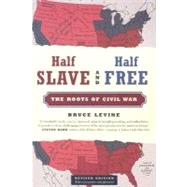Half Slave and Half Free, Revised Edition The Roots of Civil War
, by Levine, Bruce- ISBN: 9780809053537 | 0809053535
- Cover: Paperback
- Copyright: 5/11/2005
Revised Edition With a New Preface and Afterword In a revised edition, brought completely up to date with a new preface and afterword and an expanded bibliography, Bruce Levine's succinct and persuasive treatment of the basic issues that precipitated the Civil War is as compelling as ever. Levine explores the far-reaching, divisive changes in American life that came with the incomplete Revolution of 1776 and the development of two distinct social systems, one based on slavery, the other on free labor--changes out of which the Civil War developed. Bruce Levine,James G. Randall Professor of History at the University of Illinois at Urbana-Champaign, is a co-author ofWho BuiltAmerica? and the author ofThe Spirit of 1848: German Immigrants, Labor Conflict, and the Coming of Civil Warand Confederate Emancipation: Southern Plans to Free Slaves during the Civil War. Half Slave and Half Freeis a succinct and persuasive treatment of the basic issues and social transformation that precipitated the Civil War. Now in a revised edition that includes a new preface, a new afterword, and a revised and expanded bibliographic essay, Bruce Levine's impressive work is brought completely up to date. Its argument is still compelling: that a popular basis for the Civil War developed out of the far-reaching and divisive changes in America life that came with the incomplete Revolution of 1776changes that led to two very distinct social systems, one based on slavery, the other on free labor, which eventually made sectional differences within the framework of the Union irreconcilable. "A solid introduction to antebellum social structure . . . [One would] be hard put to find a more accessible introduction to the social progresses that were coincident with the coming of the Civil War."Jane H. Pease,The Journal of American History "A remarkable work, concise, vigorously argues, thought-provoking, and authoritative. It provides a clear, challenging overview of the most pivotal crisis in American history."Steven Hahn, author of the Pulitzer Prize-winningA Nation Under Our Feet "A solid introduction to antebellum social structure . . . [One would] be hard put to find a more accessible introduction to the social processes that were coincident with the coming of the Civil War."Jane H. Pease,The Journal of American History "This skillful blending of social, cultural, and political history clarifies the complex connections between socioeconomic changes in the first half century of American nationhood and the coming of the Civil War which almost destroyed the nation. The realities and ideologies that clustered around the institution of slavery emerge as the driving force that sundered the polity and then reunited it under a new vision of the future."James M. McPherson "In a taut, smooth narrative Levine succeeds admirably in showing how a popular basis for the Civil War developed out of the contradictions inherent in America's incomplete revolution of 1776. By emphasizing the social basis of political action, he is able to explain the social foundation of what became, in Seward's phrase, an irrepressible conflict between the north and the South."William L. Barney "Skillfully organized, forcefully argued and crisply written . . . Unusually successful in relying on brevity and clarity in order to render a profound analysis of the nation's deadly encounter with racial enslavement."James Stewart "A good, clear overview of the growing divergence between North and South that culminated in Civil War. In explaining the War's origins, Levine puts the focus where it belongs: on slavery and the struggle to pr







